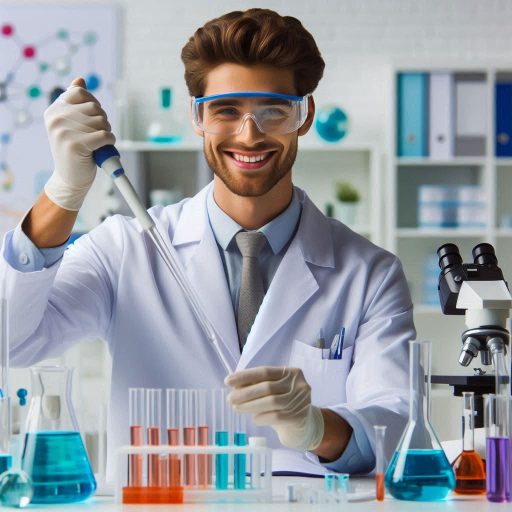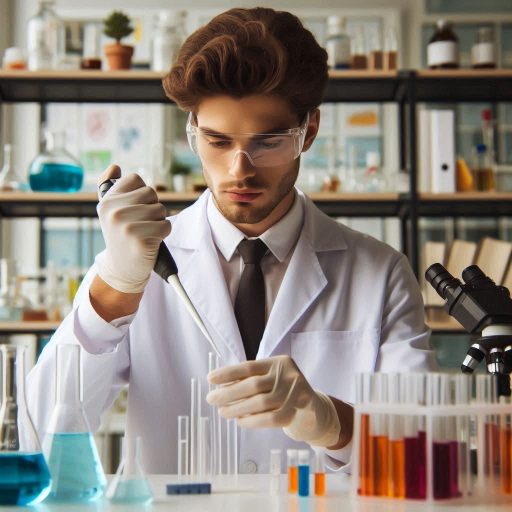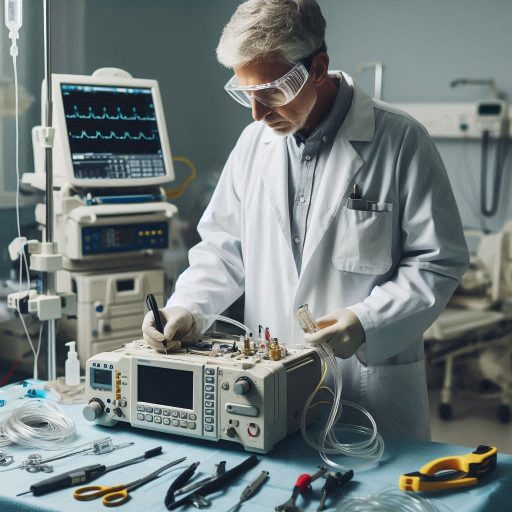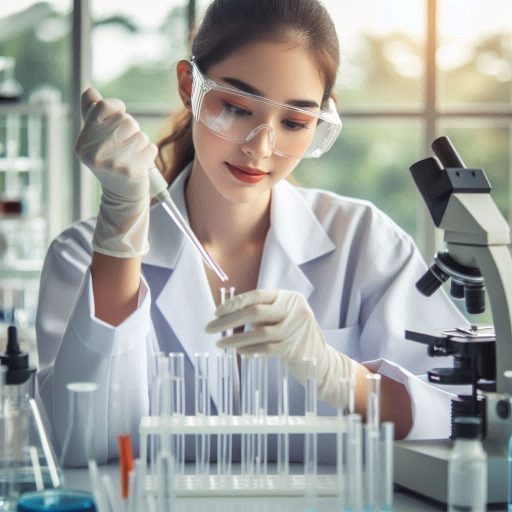Introduction
Excelling as a laboratory technician requires a combination of technical expertise, attention to detail, and a commitment to quality.
Laboratory technicians play a crucial role in the healthcare industry, ensuring accurate and timely analysis of samples that guide patient diagnosis and treatment.
To excel in this profession, you must possess a strong foundation in scientific knowledge, as well as the ability to work efficiently in a fast-paced environment.
Understanding the importance of your role and continuously developing your skills are key to achieving success as a laboratory technician.
Importance of the Role of a Laboratory Technician in the Healthcare Industry
Laboratory technicians are vital to the healthcare system, as they provide essential data for diagnosing and treating patients.
Without accurate lab results, doctors would struggle to make informed decisions about patient care.
Laboratory technicians are responsible for performing a wide range of tests, from basic blood counts to complex genetic analyses.
These results help healthcare providers understand a patient‘s condition and determine the best course of action.
The precision and reliability of a laboratory technician’s work directly impact patient outcomes, making this role indispensable in modern medicine.
Key Skills and Qualities Required to Excel in This Profession
To excel as a laboratory technician, certain skills and qualities are essential.
Firstly, attention to detail is paramount, as even the smallest error can lead to inaccurate results.
Laboratory technicians must be meticulous in following protocols and handling samples.
Strong analytical skills are also crucial, as technicians must interpret data and troubleshoot issues that arise during testing.
Additionally, excellent communication skills are necessary for effectively reporting findings to healthcare providers and collaborating with colleagues.
Finally, a commitment to continuous learning is vital, as the field of laboratory technology is constantly evolving with new advancements and techniques.
In general, excelling as a laboratory technician involves more than just technical proficiency.
It requires a deep understanding of the importance of your role in healthcare, as well as the development of key skills and qualities.
By focusing on accuracy, analytical thinking, communication, and continuous learning, you can thrive in this critical profession and contribute to better patient outcomes.
Obtain the necessary education and certification
Educational Requirements for Becoming a Laboratory Technician
Before embarking on a career as a laboratory technician, it is important to obtain the necessary education.
Most employers require candidates to have at least an associate degree in medical laboratory technology or a related field.
Some positions may also require a bachelor’s degree in medical technology or a related discipline.
Coursework in a laboratory technician program typically includes classes in biology, chemistry, microbiology, and mathematics.
Hands-on training in a laboratory setting is also a crucial component of the educational experience.
Students learn how to perform tests, analyze samples, and use laboratory equipment effectively.
Additionally, some employers may prefer candidates who have completed a clinical internship or externship as part of their educational program.
This real-world experience allows students to apply their knowledge in a professional setting and gain valuable practical skills.
The Importance of Obtaining Certification
While not all states require laboratory technicians to be certified, obtaining certification from a recognized professional organization can enhance job prospects and demonstrate competence in the field.
The American Society for Clinical Pathology (ASCP) and the National Accrediting Agency for Clinical Laboratory Sciences (NAACLS) are among the organizations that offer certification for laboratory technicians.
Certification exams typically cover topics such as laboratory procedures, safety protocols, and quality control measures.
Passing the exam demonstrates proficiency in these areas and can set you apart from other job candidates.
It also shows employers that you are committed to ongoing professional development and upholding high standards of practice.
Moreover, some employers may require certification as a condition of employment or offer salary incentives to certified laboratory technicians.
In a competitive job market, having certification can give you a competitive edge and increase your earning potential.
Tips for Choosing the Right Educational Program and Certification Exam
- Research different educational programs to find one that aligns with your career goals and interests.
- Consider factors such as program accreditation, curriculum, faculty qualifications, and facilities/resources.
- Look for programs that offer hands-on training opportunities and opportunities for real-world experience.
- Check the certification requirements and exam eligibility criteria for the organization you plan to seek certification from.
- Prepare for the certification exam by reviewing study materials, taking practice tests, and seeking guidance from current or former test takers.
- Consider professional development opportunities after obtaining certification to stay current in the field and enhance your skills.
By following these tips and obtaining the necessary education and certification, you can set yourself up for success as a laboratory technician and excel in your chosen career path.
Read: Online Courses for Surveying and Mapping Technicians
Develop Strong Technical Skills
The Importance of Having Strong Technical Skills in Conducting Laboratory Tests
Mastering technical skills is crucial for laboratory technicians.
Accuracy in tests and procedures is non-negotiable.
These skills ensure reliable results that doctors and scientists depend on for diagnosis and research.
Mistakes in technique can lead to incorrect outcomes, risking patient safety and research validity.
Therefore, developing and refining your technical abilities is vital.
Laboratory work requires precise measurements, careful handling of samples, and meticulous attention to detail.
Strong technical skills also enable you to troubleshoot issues, operate complex equipment, and ensure that all procedures follow strict protocols.
Continuous improvement in these skills forms the backbone of any successful laboratory career.
The Most Common Laboratory Techniques and Procedures That Technicians Should Be Proficient In
Proficiency in common laboratory techniques is essential for every technician.
Techniques such as pipetting, microscopy, and spectrophotometry are foundational.
Pipetting requires precise volume measurements, ensuring sample accuracy.
Mastery of microscopy is necessary for observing and analyzing cells and microorganisms.
Spectrophotometry involves measuring the amount of light absorbed by a sample, which is crucial for many chemical and biological tests.
Additionally, technicians should be skilled in centrifugation, a process used to separate components of a sample based on density.
Understanding and implementing these techniques accurately ensures the reliability of test results.
Moreover, technicians must stay updated on standard operating procedures (SOPs) and laboratory protocols to maintain consistency and quality in their work.
Improving Technical Skills Through Hands-On Experience and Additional Training
Improving technical skills requires hands-on experience and ongoing training.
Regular practice in the lab enhances proficiency and builds confidence in handling complex tasks.
Participating in workshops, seminars, and specialized training programs can expand your knowledge of advanced techniques and emerging technologies.
Seeking mentorship from experienced colleagues can provide valuable insights and guidance.
Additionally, online courses and certifications offer opportunities to learn at your own pace, deepening your understanding of specific areas like molecular biology or biochemistry.
To stay ahead, engage in continuous learning and self-assessment.
Actively seek feedback from peers and supervisors to identify areas for improvement and take proactive steps to address them.
By committing to lifelong learning, you ensure that your technical skills remain sharp and relevant, positioning yourself for success in the ever-evolving field of laboratory science.
Read: CAD Technician Salary: What to Expect in the USA
Focus on accuracy and attention to detail
Accuracy and attention to detail are crucial aspects of being a successful laboratory technician.
They directly impact the reliability and validity of the results you produce.
Here are some key points to help you excel in this area:
The importance of accuracy
- Accuracy is the foundation of laboratory testing. It ensures that the results you generate are reliable and can be trusted by healthcare professionals.
- Even a small error in measurement or technique can lead to incorrect results, which can have serious consequences for patient care.
- Always double-check your work and follow standardized protocols and procedures to minimize the risk of errors.
Tips for developing a keen eye for detail
- Pay close attention to the details of each step in the testing process. Familiarize yourself with the specific requirements of each test you perform.
- Practice good organization skills to keep track of samples, reagents, and data. Maintain a clean and clutter-free work area to minimize distractions.
- Take the time to review your work before finalizing results. Look for inconsistencies or anomalies that may indicate errors.
Avoiding common errors in the lab
- Be aware of potential sources of error, such as contamination, improper calibration, or inaccurate measurements. Take steps to mitigate these risks.
- Document your work accurately and thoroughly. Keep detailed records of procedures, observations, and results to ensure traceability and reproducibility.
- Seek feedback from colleagues or supervisors on your work. Learn from mistakes and continuously strive to improve your skills and knowledge.
Consequences of being careless or sloppy
- Being careless or sloppy in a laboratory setting can have serious repercussions.
It can compromise the integrity of the results you produce. - Errors in testing can lead to misdiagnosis, incorrect treatment plans, or delays in patient care.
This can jeopardize patient safety and well-being. - Maintaining a high standard of accuracy and attention to detail is essential for upholding the credibility and reputation of the laboratory and its staff.
By emphasizing the importance of accuracy, developing a keen eye for detail, avoiding common errors, and understanding the consequences of carelessness, you can excel as a laboratory technician and contribute to the delivery of quality healthcare services.
Read: Top CAD Software for Aspiring CAD Technicians

Enhance Communication and Teamwork Skills
Effective communication and teamwork are essential for laboratory technicians.
In a laboratory setting, where precision is paramount, clear communication ensures that every team member understands their role.
Misunderstandings can lead to errors that compromise patient care.
By developing strong communication skills, laboratory technicians can contribute to a more efficient and error-free environment.
Effective communication fosters collaboration, making it easier to manage complex tasks and maintain a harmonious workplace.
The Significance of Effective Communication and Teamwork in a Laboratory Setting
Communication and teamwork are vital in laboratories because they directly impact patient outcomes.
Laboratory technicians often work with various healthcare professionals, including doctors and nurses, to provide accurate test results.
Effective communication ensures that the correct tests are performed, and results are interpreted correctly.
It also helps in preventing errors that could lead to incorrect diagnoses or treatments.
Teamwork, on the other hand, enhances productivity by ensuring that tasks are distributed efficiently, and everyone is working towards the same goal.
In a laboratory setting, where time and accuracy are critical, communication and teamwork are not just beneficial‘they are necessary.
Strategies for Collaborating with Colleagues, Physicians, and Other Healthcare Professionals
Collaboration in a laboratory involves working closely with colleagues, physicians, and other healthcare professionals.
To excel in this, laboratory technicians should prioritize active listening.
Active listening involves fully focusing on the speaker, understanding their message, and responding thoughtfully.
This practice helps to avoid miscommunication and ensures that everyone is on the same page.
Another strategy is to maintain open lines of communication through regular meetings or briefings.
This ensures that everyone involved in patient care is informed about any changes or updates.
Laboratory technicians should also be willing to ask questions when instructions are unclear.
Clarifying information helps to prevent errors and demonstrates a commitment to accuracy and patient safety.
How Good Communication Skills Can Prevent Misunderstandings and Improve Overall Patient Care
Good communication skills are crucial for preventing misunderstandings that could compromise patient care.
In a laboratory, even minor errors can have significant consequences.
For example, mislabeling a sample or misunderstanding a test request can lead to incorrect results.
This can delay treatment or lead to improper medical decisions.
By honing communication skills, laboratory technicians can minimize these risks.
Clear communication ensures that instructions are understood correctly and that any concerns are addressed promptly.
Additionally, good communication builds trust among team members, fostering a supportive environment where everyone works together towards optimal patient care.
In review, effective communication and teamwork are not just skills but essential components of a successful laboratory career.
Read: How to Become a CAD Technician: Step-by-Step Guide
See Related Content: Interview Tips for Chemical Engineering Jobs
Transform Your Career Today
Unlock a personalized career strategy that drives real results. Get tailored advice and a roadmap designed just for you.
Start NowStay updated on industry trends and advancements
Keeping abreast of industry trends and advancements is crucial for excelling as a laboratory technician.
By staying up-to-date with the latest innovations and best practices, you can enhance your skills, improve efficiency, and provide better results in your work.
Continuous Learning and Professional Development
As a laboratory technician, it’s essential to prioritize continuous learning and professional development.
This can involve pursuing additional certifications, taking relevant courses, or attending workshops and seminars to expand your knowledge base.
By investing in your education and skill development, you can stay ahead in your field and adapt to the evolving technological landscape of the industry.
Importance of Attending Conferences, Workshops, and Webinars
Attending industry conferences, workshops, and webinars is an excellent way to stay informed about the latest trends and advancements in laboratory technology.
These events provide opportunities to network with professionals, learn from experts, and gain valuable insights that can benefit your work.
By participating in such gatherings, you can expand your knowledge, stay motivated, and remain updated on the latest tools and techniques in the field.
Accessing Reliable Sources of Information
In the age of information overload, it’s crucial to access reliable sources of information in the industry.
Whether it’s subscribing to reputable journals, following influential figures in the field, or utilizing online platforms for learning, having access to credible resources can help you stay informed and educated.
By staying connected to trustworthy sources, you can ensure that you are up-to-date on the latest trends, advancements, and best practices in laboratory technology.
Practice Good Laboratory Safety and Hygiene
Practicing good laboratory safety and hygiene is crucial for any laboratory technician.
By strictly adhering to safety protocols, you not only protect yourself but also your colleagues and the environment.
A clean and organized work environment reduces the likelihood of accidents and enhances efficiency.
It‘s essential to be vigilant about maintaining order in your workspace, ensuring that all equipment is properly stored and chemicals are labeled accurately.
Keeping your workspace clean and organized also reflects your professionalism and commitment to high standards in your work.
The Importance of Following Safety Protocols and Maintaining a Clean and Organized Work Environment
Following safety protocols in a laboratory setting is non-negotiable.
These guidelines are designed to minimize the risk of accidents and ensure that laboratory activities proceed smoothly.
Adhering to safety protocols, such as wearing appropriate personal protective equipment (PPE) and following proper procedures for handling chemicals, is vital.
Additionally, maintaining a clean and organized work environment is essential.
A cluttered workspace can lead to errors, spills, and accidents.
Regularly cleaning your workspace, properly labeling chemicals, and storing equipment correctly are fundamental practices that contribute to a safer and more efficient laboratory environment.
Common Safety Hazards in a Laboratory Setting and How to Prevent Accidents
Laboratories are filled with potential safety hazards, from chemical spills to equipment malfunctions.
Understanding these hazards and how to prevent them is essential for any laboratory technician.
One common hazard is exposure to toxic chemicals, which can occur through inhalation, skin contact, or ingestion.
Preventing chemical exposure involves using fume hoods, wearing gloves, and handling chemicals carefully.
Another common hazard is the risk of fires or explosions, often caused by improper handling of flammable substances.
To prevent such incidents, it‘s crucial to store flammable materials safely and avoid using open flames near volatile chemicals.
Electrical hazards, such as faulty wiring or improper use of equipment, can also pose risks.
Ensuring that all equipment is in good working order and following manufacturer guidelines for use can help prevent accidents.
Tips for Handling Hazardous Materials and Waste Properly to Protect Oneself and Others
Proper handling of hazardous materials and waste is essential to ensure the safety of everyone in the laboratory.
First, always use the correct personal protective equipment (PPE), such as gloves, goggles, and lab coats, when handling hazardous substances.
Ensure that all hazardous materials are properly labeled with the correct safety information and that they are stored according to their specific requirements.
When disposing of hazardous waste, follow your laboratory‘s waste disposal guidelines strictly.
This often involves segregating different types of waste, using designated containers, and disposing of them through appropriate channels.
Additionally, never underestimate the importance of proper training.
Ensure that you are fully trained in handling hazardous materials and that you are aware of the emergency procedures in case of accidental exposure or spills.
By following these tips, you can minimize risks and contribute to a safer laboratory environment.
Explore Further: Petroleum Engineer: Roles and Responsibilities
Conclusion
The Key Points Discussed in the Blog Post on Excelling as a Laboratory Technician
Excelling as a laboratory technician requires a blend of technical skills, professionalism, and a commitment to continuous learning.
Throughout this blog post, we’ve highlighted the critical areas that contribute to success in this field.
Mastering laboratory techniques and maintaining a solid foundation in scientific knowledge are essential.
A keen attention to detail ensures accuracy in every task performed.
Effective communication, both within the team and when documenting results, is vital.
We’ve also emphasized the importance of staying organized to manage the demands of the laboratory environment efficiently.
Lastly, the pursuit of continuous education allows laboratory technicians to stay current with industry advancements and technologies, ensuring they remain competitive and effective in their roles.
The Importance of Continuous Learning, Professionalism, and Attention to Detail in This Profession
Continuous learning is not just beneficial; it is necessary for laboratory technicians.
The field of laboratory science evolves rapidly, with new techniques, equipment, and protocols constantly emerging.
By engaging in regular professional development, attending workshops, and obtaining certifications, technicians can keep their skills sharp and up-to-date.
Professionalism is another cornerstone of success in this career.
Laboratory technicians must uphold high ethical standards, maintain patient confidentiality, and exhibit a strong work ethic.
Their professional demeanor directly impacts the credibility of the laboratory and the trust placed in them by healthcare providers and patients.
Attention to detail is critical in this profession, as even minor errors can lead to significant consequences.
By being meticulous and thorough in their work, laboratory technicians ensure the reliability and accuracy of test results, which is crucial for patient care.




